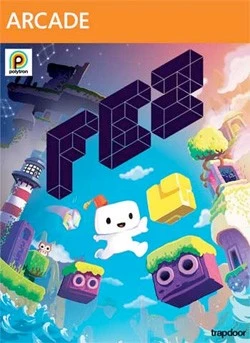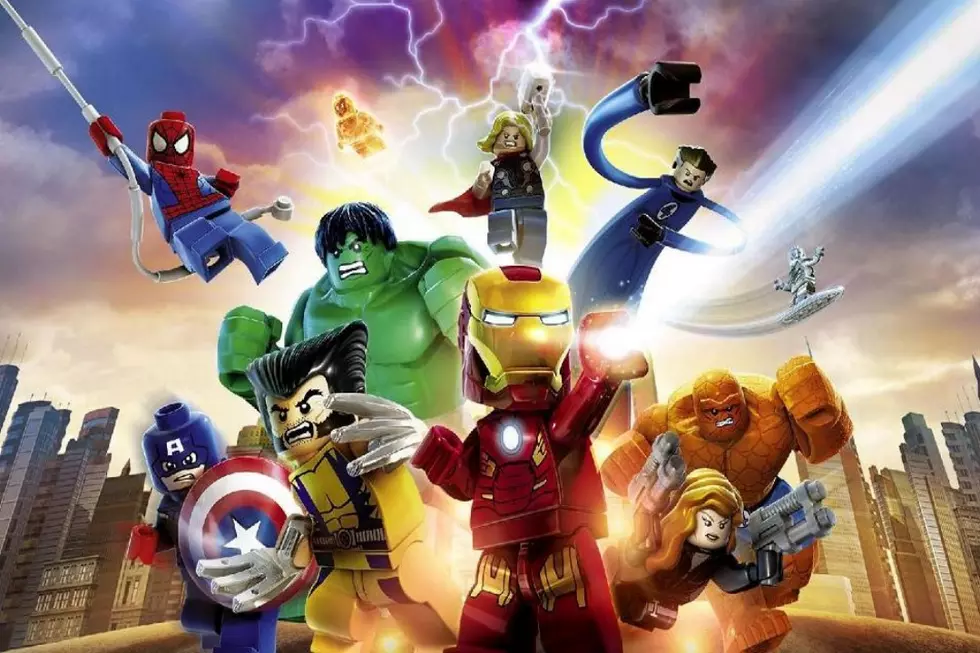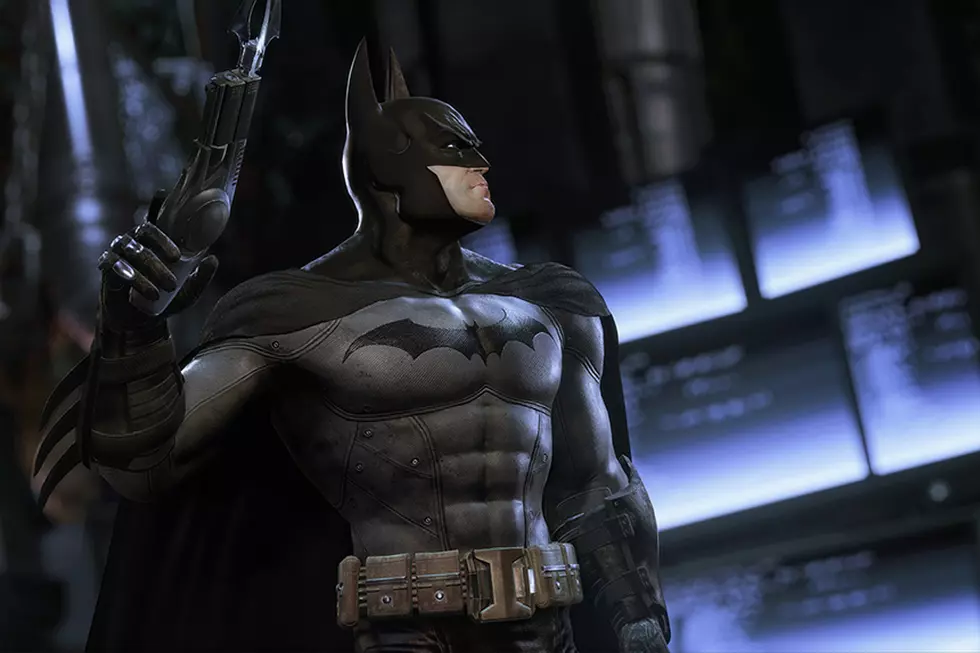
Ask Chris #117: Why I Hate Video Games
Over a lifetime of reading comics, Senior Writer Chris Sims has developed an inexhaustible arsenal of facts and opinions. That's why each and every week, we turn to you, to put his comics culture knowledge to the test as he responds to your reader questions!

Q: What do you have against video games? You use even highly acclaimed ones (like the Arkham series and Max Payne) as a watchword for bad storytelling, with no further explanation evidently needed. Why the hate? -- Ben, via email
A: I've gotten a lot of Ask Chris questions over the past few years, but I think this is the first one I've been absolutely mystified by. I mean, usually when people are mad at me because I hate something -- which is often -- it's an opinion that I actually have. You might as well ask me what I have against pro wrestling and why I seem to hate this Batman guy so much.
Then again, it's not like I'm short of opinions on how bad storytelling can wreck a video game. And that, I'm sure, surprises no one.I don't get to talk about video games too often here at CA unless they're tied into comics -- my glowing, three-years-too-late review of the glorious 50 Cent: Blood On The Sand was literally a Valentine's Day present from former editor Laura Hudson -- but I've written a lot about them elsewhere, and I'm fascinated by how storytelling works in the medium and how it's tied to the development of technology. I first got an NES when I was five, and just in the 25 years since, they've gone from the simplest possible plots like "go right, kill bad guy, save princess and/or world" to complex, sweeping narratives with multiple outcomes determined by decisions that are made by someone completely separate from the creators. That's pretty amazing.
As obvious as it is, that's the element that really defines video games: Interactivity. Even the simplest game with the simplest story is built to give the players a level of agency that nothing else can do. When you're describing, for example, a Batman story to your friends, it's always about how Batman beat the Joker; there's a level of detachment to the events even before you get around to discussing the creators. With video games, it's "I beat the Joker." "I saved the princess." "I got to level 19 before the stupid computer stopped giving me long pieces." Even if it's someone else's character, you're the one having the experience, and because of that, the audience is a necessary factor in completing the story.
But that's also where a lot of the trouble comes in.
I've never done it, but I imagine creating a video game is monumentally difficult, because there are so many different aspects warring with each other for importance, and if any one of them goes bad it can tank the whole thing. The most important part of any game is gameplay -- you have to be able to actually play it to get anything else out of it, after all -- but as technology has advanced to allow for more complex storytelling, that's often just as important. Thing is, when your story requires the audience to actively participate in its completion, there's often a built-in conflict between what makes a great story and what makes a great game.
 Which brings us to the Arkham games, specifically Arkham City. I actually love that game -- back when it came out, I wrote what I thought was an overwhelmingly positive review of it with a couple of complaints about dialogue -- but the story that you're playing through in it is an absolute mess. It might actually be one of the best examples of how gameplay can be at odds with storytelling, starting with the way that both Arkham City and its predecessor, Arkham Asylum, have the annoying tendency to ramp up the drama by having the bad guys just straight up slaughter all the good-guy NPCs. Since a good portion of the game is built around challenging you as a player to save people, the fact that they just end up dying anyway lessens those accomplishments, making them seem ultimately pointless.
Which brings us to the Arkham games, specifically Arkham City. I actually love that game -- back when it came out, I wrote what I thought was an overwhelmingly positive review of it with a couple of complaints about dialogue -- but the story that you're playing through in it is an absolute mess. It might actually be one of the best examples of how gameplay can be at odds with storytelling, starting with the way that both Arkham City and its predecessor, Arkham Asylum, have the annoying tendency to ramp up the drama by having the bad guys just straight up slaughter all the good-guy NPCs. Since a good portion of the game is built around challenging you as a player to save people, the fact that they just end up dying anyway lessens those accomplishments, making them seem ultimately pointless.
In a lot of ways, it also suffers from some of the same problems that I have with Hush. Mainly, it also includes Hush. But more than that, both stories try to be too much at once. They throw in every villain they can fit, which just ends up making things muddled and lessening their dramatic impact. The climax, for example, involves a sequence of something like five separate fake-out moments, where each big reveal is even more improbable than the last. And that's after you spend the entire game fighting a whole roster of super-villains. It doesn't focus on anything enough to make one moment seem more important than the last, and frequently makes absolutely no sense.
But it's still a great game, and again, it's that gameplay/storytelling conflict that saves it. As a Batman fan, I want to see all those bad guys show up on my TV screen, and as someone who likes playing the game -- the actual act of pushing a button to make Batman punch a dude in the face -- I want to fight a bunch of different bad guys in interesting environments. It's fun. Does it make sense for there to be an entire bizarre steampunk city underneath Gotham City? No. Does it make sense for the city to have walled off a museum full of exhibits and left it to be overrun by criminals? No. None whatsoever. But, it makes for a very interesting place for Batman to swing around and do karate, so I'll roll with it because it's fun.

The same thing happened with Arkham Asylum, too. The Joker as a character isn't really a physical threat. He exists to challenge Batman on a mental and moral level, because Batman's always going to win in a physical confrontation. Side note: Remember that scene in The Dark Knight where Batman's trying to beat information out of him in the interrogation room and the Joker is taunting him by telling him "you have nothing to do with all your strength?" So great. But unfortunately for the storyline of Arkham Asylum, playing out a moral victory is actually pretty boring. "Press A to be a better person" might work in your quirky XBLA puzzle-platformers (more on those in a minute), but Arkham Asylum was built around combat. It's an entire game about making Batman beat the living hell out of people in ways that are fun to watch, but because it's all building to a conflict between Batman and the Joker, they have to do something to cap it off.
So they have the Joker turn himself into a big strong monster and then Batman beats him by punching him with a punch that is also a bomb.
That is dumb. That is dumb as hell. That is, like, Axe Cop levels of "did a five year-old write this?"
But (much like Axe Cop), it's also pretty fun. It makes for an enjoyable experience, if not a great story, and in those games, the story is very clearly a secondary concern that's just there to provide a reason to get form one set-piece to another. In that respect, it's fine, but it ain't exactly a narrative triumph.
 It can go the other way, too. I'm a huge, huge fan of the Phoenix Wright games, but when you get right down to it, they're barely even "games." Most of the interactivity is limited to pushing the "next" button to manually advance the story and occasionally guessing as to which piece of evidence needs to be presented, to the point where I think Capcom could've saved us all a lot of time if they'd just put those things out as illustrated novels instead. But then, I love that story so much that I'm willing to jump through whatever hoops they put in front of me to get more of it -- and when the same developers created Ghost Trick, they managed to hit that sweet spot of gameplay and storytelling a lot better.
It can go the other way, too. I'm a huge, huge fan of the Phoenix Wright games, but when you get right down to it, they're barely even "games." Most of the interactivity is limited to pushing the "next" button to manually advance the story and occasionally guessing as to which piece of evidence needs to be presented, to the point where I think Capcom could've saved us all a lot of time if they'd just put those things out as illustrated novels instead. But then, I love that story so much that I'm willing to jump through whatever hoops they put in front of me to get more of it -- and when the same developers created Ghost Trick, they managed to hit that sweet spot of gameplay and storytelling a lot better.
Sadly, games that are good enough to make up for their flaws tend to be few and far between. For every game that's so fun to play and has such a great aesthetic that you stop caring whether or not anything you're doing follows any kind of logic at all (Bayonetta) or that are compelling enough to make you want to keep going even though it crashes and corrupts your save file all of the God-damned time (Fallout: New Vegas), there's one where the disconnect between storytelling and gameplay wrecks the entire thing.
For me, the most recent example of the latter is Braid, the critical darling from 2008 that I only got around to a few months ago. I. Hate. That. Game. Not because of the gameplay, which was, for the most part, extremely clever, elegant and fun to play, or because of the difficulty (although I did think that sections of it went well beyond "reasonable" and into "intentionally frustrating"), but because of the story that was built inextricably into the whole experience.
On one level, I respect what game developer Jonathan Blow was doing with it. The new trend of retro-styled puzzle platformers seems to be the product of a desire to get back to that "go right, beat bad guy, save princess" era where the focus was on gameplay with a minimum of storytelling, to the point where they're recycling a lot of those old tropes, both ironically and sincerely. 2010's Limbo, for example (another game I just got around to and thought was fantastic), is built entirely on gameplay and aesthetics, with a driving plot that's pretty much just "find girl." The idea of breaking down and examining the symbolism of the platform genre and what it means by actually using all that stuff, the language of video games that's been built out of princesses and monsters and literally overcoming obstacles between you and your goal, is great. But then Blow went and told a story that's absolute bullsh**. It's muddled, the foreshadowing that's put in doesn't make sense, there's no unifying logic to the symbolism, and the actual story elements that are given to you are the most trite and contrived things this side of a first-year creative writing class. I seriously didn't know that a video game could actually be smarmy before I played that thing, but here we are.
And because the story is so intwined (or braided, get it?) with the gameplay and what makes Braid so distinct, I can't separate the two. I can't divorce the bits that I enjoyed from the bits that I didn't, because they've been built to support each other.
 It's even worse because I got into Braid because I liked Fez, a game that pulls the same trick of having a deceptively simple mechanic (you rotate the world to see four 2D sides to a 3D environment) (also you can jump) (that's pretty much it) backed up by elegant, frustrating, compelling and ultimately rewarding storytelling better than anything else that's tried. I realize that I'm the one playing them out of order -- Fez was only released this year, four years after Braid was such a huge success -- but still, Braid definitely suffers by comparison.
It's even worse because I got into Braid because I liked Fez, a game that pulls the same trick of having a deceptively simple mechanic (you rotate the world to see four 2D sides to a 3D environment) (also you can jump) (that's pretty much it) backed up by elegant, frustrating, compelling and ultimately rewarding storytelling better than anything else that's tried. I realize that I'm the one playing them out of order -- Fez was only released this year, four years after Braid was such a huge success -- but still, Braid definitely suffers by comparison.
And that finally brings us back around to the games that manage to do a great job combining storytelling and gameplay. There's the Mass Effect series, which I loved from start to finish, but also made for a truly fascinating conflict between the audience, which had been incredibly involved in the completion of the story, and the creators, who were ultimately the final arbiters of what that story was. That's a game that's just full of insanely well-done character work and interesting world-building, to the point where they actually created an entire race of sexy blue doe-eyed space-bisexuals that were genetically driven to spend a third of their lives as go-go dancers and somehow made it not the dumbest thing I've ever seen.
Fallout 3 is another great one, particularly those early levels where you're dropped into an openly hostile environment and have to scrounge for what few bullets you can find and often find yourself running from something that will most definitely kill you with a feeling of genuine desperation. Plus, it's got a gorgeous and evocative aesthetic, both visually and musically, and gives you major choices that affect the world around you in a way that a lot of games only flirt with.
And believe it or not, I really, really like the storytelling in Ezio's arc of Assassin's Creed. I only made it about an hour into the first one, but AC2 fixed virtually every problem I had with the gameplay, to the point where it was an absolute joy. Brotherhood in particular did a great job with theming, so that everything the gameplay allowed you do to -- parkouring all over Rome and stabbing dudes -- was tied in with the story they were telling. I still could not care less about Desmond, though, even if the idea of playing a video game about a dude playing a video game is pretty hilarious.
Also? Lollipop Chainsaw. No joke.
And before anyone asks, first-person shooters make me dizzy, so I've never played Portal, though I understand it's fantastic. You'll just have to hear how great it is from literally every other person on the Internet.
The one that really stands out for its treatment of storytelling and gameplay, though, is Red Dead Redemption, even though I haven't played it in a while.

The amazing thing isn't that it perfectly blends those two elements, but that it keeps the conflict between them, and uses it to draw you deeper as a player. It's something that Rockstar experimented with in previous games. There's a great bit in Bully where the villain taunts you for wasting time on mini-games like bike races while he was off consolidating his evil plan, and Grand Theft Auto IV's Niko Bellic is such a defined character that it's actually difficult for me as a player to rationalize doing everything that used to be fun about GTA, like driving over pedestrians and blowing things up. The thought that popped into my head while playing was "Niko wouldn't do that," but I'm literally the person controlling what Niko does and doesn't do.
Incidentally, for all the explosions murders, you go to Saints Row The Third, the single greatest video game in human history. But that masterpiece is another column.
In Red Dead Redemption, the developers at Rockstar not only created that same conflict by putting the desires of the player at odds with the desires of the character, they put the focus on it. All John Marston wants to do is go home to his family, so in theory, I should be doing a speed run of that game to get him home as fast as possible. Instead, they've given me a gigantic open world of side-missions and collectible nonsense to explore. That's what I want to do, so, sorry John. We're doing what Chris wants to do, because you do not have an XBox controller in that holster.
That's pretty standard stuff, but then, the game actually takes it a step further. You get to the point where Marston's goal is achieved and he's reunited with his family, but the game doesn't end. It's entirely possible to just turn it off and stop playing right there, and if you do, John Marston's story has a happy ending. It's entirely up to you, because again, you're the one with the controller. But because the game is telling you that you can continue, the desire of the player is to do just that, even though anyone with even a passing familiarity of how storytelling works knows what happens if you keep going once you get past the happy ending.
The whole thing is brilliant. Not just because it's a well-written story with good characters, but because it uses a level of interaction, choice, and completion on the part of the audience to tell that story. You don't get the on-screen choices like you do in Mass Effect, but you're complicit in every step just by virtue of playing. That's what makes a great video game story, and it's the same thing that makes a great comic, or a great film, or a great song: Doing something that's impossible in every other medium, no matter how simple or complex, and doing it well.
So trust me: While there are definitely a bunch of 'em that I don't like, I do not hate video games, especially not the Arkham series. As for Max Payne, I played it when it came out and thought it was fun and pretty goofily over-the-top. The only time I can find that I've mentioned it on the site was when I clowned David Uzumeri for comparing it to The Dark Knight, and you know what?
I stand by that one.
That's all we have for this week, but if you've got a question you'd like to see Chris tackle in a future column, just send it to @theisb on Twitter with the hashtag #AskChris, or send an email to chris@comicsalliance.com with [Ask Chris] in the subject line!
More From ComicsAlliance









